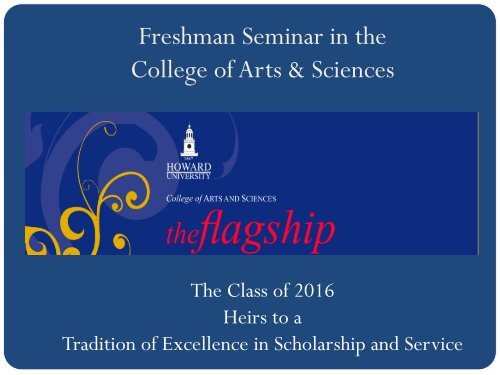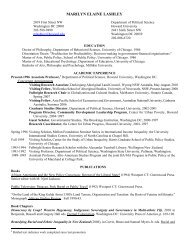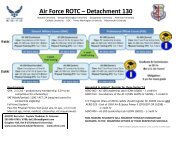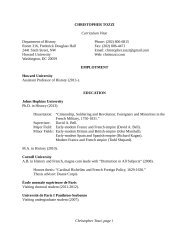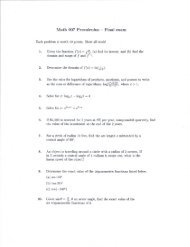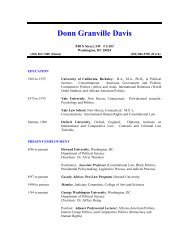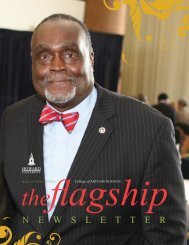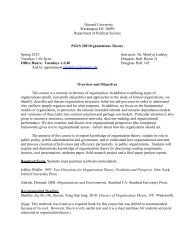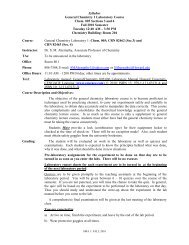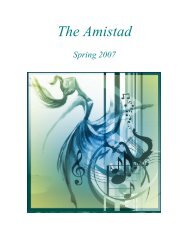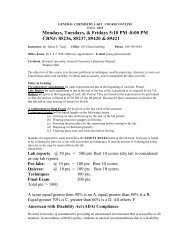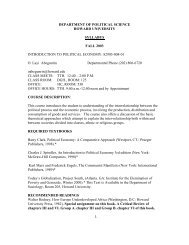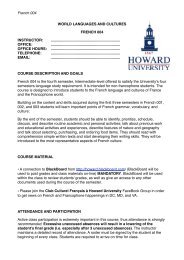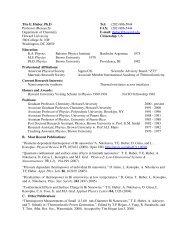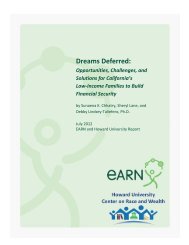Freshman Seminar in the College of Arts & Sciences - COAS
Freshman Seminar in the College of Arts & Sciences - COAS
Freshman Seminar in the College of Arts & Sciences - COAS
You also want an ePaper? Increase the reach of your titles
YUMPU automatically turns print PDFs into web optimized ePapers that Google loves.
<strong>Freshman</strong> <strong>Sem<strong>in</strong>ar</strong> <strong>in</strong> <strong>the</strong><br />
<strong>College</strong> <strong>of</strong> <strong>Arts</strong> & <strong>Sciences</strong><br />
The Class <strong>of</strong> 2016<br />
Heirs to a<br />
Tradition <strong>of</strong> Excellence <strong>in</strong> Scholarship and Service
The <strong>College</strong> <strong>of</strong> <strong>Arts</strong> & <strong>Sciences</strong> <strong>Freshman</strong> <strong>Sem<strong>in</strong>ar</strong> encourages you to become<br />
engaged participants <strong>in</strong> <strong>the</strong> <strong>in</strong>tellectual and cultural life <strong>of</strong> African peoples<br />
throughout <strong>the</strong> Diaspora by explor<strong>in</strong>g this rich history and legacy and this<br />
legacy’s vibrant contemporary work and <strong>in</strong>stitutional life. Carefully planned<br />
lectures, forums, activities and projects, and discussions will help you feel<br />
confident and comfortable <strong>in</strong> your new role as students at Howard University<br />
and as citizens <strong>of</strong> <strong>the</strong> world.
The Research Question<br />
Each year, students seek to answer a<br />
broad question that weekly lecturers<br />
engage. This year’s question is<br />
How have scholars across various fields <strong>of</strong><br />
study contributed through research and<br />
praxis to <strong>the</strong> restoration <strong>of</strong> human dignity<br />
<strong>in</strong> <strong>the</strong> wake <strong>of</strong> atrocities and traumas over<br />
time?
Learn<strong>in</strong>g, Wisdom, and<br />
The African World Experience<br />
Ipet Isut (Karnak): White Chapel <strong>of</strong> Senusret I<br />
This lecture exam<strong>in</strong>es <strong>the</strong> contribution to global traditions and<br />
<strong>in</strong>novations <strong>in</strong> teach<strong>in</strong>g and learn<strong>in</strong>g from <strong>the</strong> classical, medieval,<br />
and contemporary African experience.
“Omoluabi”:<br />
Self Actualization and Communal Responsibility<br />
Omoluabi is <strong>the</strong> essence <strong>of</strong> <strong>the</strong> human person, a<br />
wellspr<strong>in</strong>g <strong>of</strong> good character, exemplified by an<br />
understand<strong>in</strong>g <strong>of</strong> <strong>the</strong> self and its responsibilities to <strong>the</strong><br />
community. This lecture analyzes <strong>the</strong> concept <strong>of</strong><br />
Omoluabi and its relevance <strong>in</strong> <strong>the</strong> project <strong>of</strong> useful<br />
learn<strong>in</strong>g.
Abandonment and Dismemberment:<br />
“Someth<strong>in</strong>g Torn and New”<br />
This lecture exam<strong>in</strong>es <strong>the</strong> trauma <strong>of</strong> enslavement and how Africans<br />
created, preserved, and extended <strong>the</strong>ir humanity as <strong>the</strong> foundation for<br />
<strong>the</strong> contemporary African world experience and <strong>the</strong> perpetual human<br />
quest for a better society.
Memory, Restoration, and African Renaissance: Social<br />
Consciousness and <strong>the</strong> Black Imag<strong>in</strong>ation<br />
• Ngugi wa Thiong’o has written that “<strong>the</strong> African<br />
eagle can fly only with his re-membered w<strong>in</strong>gs.”<br />
The process <strong>of</strong> “re-member<strong>in</strong>g”—<strong>of</strong> reconnect<strong>in</strong>g<br />
historical memory to modern social consciousness<br />
as a renaissance and flower<strong>in</strong>g <strong>of</strong> imag<strong>in</strong>ation,<br />
<strong>in</strong>novation and problem solv<strong>in</strong>g—will lead to<br />
conscious contributions to what Ngugi calls “a<br />
common humanity <strong>of</strong> progress and achievement.”<br />
The central elements <strong>of</strong> this <strong>in</strong>tellectual practice are<br />
translation and recovery. This lecture <strong>in</strong>troduces<br />
you to <strong>the</strong> use <strong>of</strong> academic research skills to<br />
connect ideas and <strong>in</strong>formation across generations<br />
and among cultural communities.
Research and Methodology:<br />
Inscription as a Liberat<strong>in</strong>g Practice<br />
This lecture <strong>in</strong>troduces students to<br />
pr<strong>in</strong>ciples <strong>of</strong> undergraduate research and<br />
<strong>of</strong>fers <strong>in</strong>sight <strong>in</strong>to <strong>the</strong> methodologies<br />
characteristic <strong>of</strong> and sometimes unique to<br />
scholarship at Howard.
Practices <strong>of</strong> Freedom and Justice:<br />
The Black Diaspora<br />
The pursuit <strong>of</strong> freedom and justice has been a rally<strong>in</strong>g cry <strong>of</strong> <strong>the</strong><br />
educated <strong>in</strong> this oldest <strong>of</strong> traditions. This lecture identifies and analyzes<br />
<strong>the</strong> works <strong>of</strong> representative th<strong>in</strong>kers who have contributed to <strong>the</strong><br />
tradition <strong>of</strong> learn<strong>in</strong>g for service to <strong>the</strong> communities <strong>of</strong> people <strong>of</strong> African<br />
descent, both on <strong>the</strong> home cont<strong>in</strong>ent and <strong>in</strong> its vast Diaspora,<br />
and to <strong>the</strong> world.
“The Eloquence <strong>of</strong> <strong>the</strong> Scribes”: Initiation, Expectations, and Mastery<br />
Cont<strong>in</strong>u<strong>in</strong>g <strong>the</strong> Legacy <strong>of</strong> Howard University<br />
This lecture aims at rem<strong>in</strong>d<strong>in</strong>g you <strong>of</strong> <strong>the</strong> high<br />
expectations <strong>of</strong> this <strong>in</strong>stitution, <strong>of</strong> your<br />
ancestors, and <strong>of</strong> future generations; it <strong>the</strong>n<br />
seeks to <strong>in</strong>itiate you <strong>in</strong>to full awareness <strong>of</strong> <strong>the</strong><br />
tradition <strong>of</strong> Howard students and faculty to<br />
pursue relentlessly <strong>the</strong> mastery necessary to<br />
fulfill <strong>the</strong> University’s mission.
The Presidential Address: A Charge to Keep<br />
At <strong>the</strong> core <strong>of</strong> <strong>the</strong> ideas <strong>of</strong> wisdom, community responsibility,<br />
learn<strong>in</strong>g, and service is <strong>the</strong> expectation that those who have<br />
mastered and served must pass <strong>the</strong>ir wisdom and experience on to<br />
<strong>the</strong> next generation. This lecture, delivered by President Sidney A.<br />
Ribeau, highlights <strong>the</strong> examples <strong>of</strong> women and men who, through<br />
<strong>the</strong>ir contribution to all forms <strong>of</strong> human knowledge, have kept <strong>the</strong><br />
charge <strong>of</strong> model<strong>in</strong>g good character while labor<strong>in</strong>g to build <strong>the</strong><br />
beloved community.
The Mark E. Mack New York African Burial Ground Tour<br />
The “African Burial Ground project began <strong>in</strong> 1991, when, dur<strong>in</strong>g<br />
excavation work for a new federal <strong>of</strong>fice build<strong>in</strong>g, workers discovered<br />
<strong>the</strong> skeletal rema<strong>in</strong>s <strong>of</strong> <strong>the</strong> first <strong>of</strong> more than 400 men, women and<br />
children. Fur<strong>the</strong>r <strong>in</strong>vestigation revealed that dur<strong>in</strong>g <strong>the</strong> 17th and 18th<br />
centuries, free and enslaved Africans were buried <strong>in</strong> a 6.6 acre burial<br />
ground <strong>in</strong> lower Manhattan outside <strong>the</strong> boundaries <strong>of</strong> <strong>the</strong> settlement<br />
<strong>of</strong> New Amsterdam, which would become New York. Over <strong>the</strong><br />
decades, <strong>the</strong> unmarked cemetery was covered over by development<br />
and landfill.”<br />
In May 2012, <strong>the</strong> tour was named after Pr<strong>of</strong>essor Mark E. Mack<br />
(1962-2012), a master teacher, scholar, and mentor who served as<br />
<strong>the</strong> Curator <strong>of</strong> Howard’s W. Montague Cobb Biological Anthropology<br />
Laboratory, which houses <strong>the</strong> skeletal rema<strong>in</strong>s data <strong>of</strong> <strong>the</strong> New York<br />
African Burial Ground.<br />
Dates: September 15 and September 22
www.coas.howard.edu/freshmansem<strong>in</strong>ar
Course Evaluation<br />
• <strong>Freshman</strong> <strong>Sem<strong>in</strong>ar</strong> classes are taught under <strong>the</strong> Pass/Fail<br />
system. Through this arrangement you will receive a<br />
designation <strong>of</strong> “P” if your work is evaluated at <strong>the</strong> satisfactory<br />
level (80% or higher). Although pass (“P”) grades are not<br />
recorded <strong>in</strong> <strong>the</strong> overall GPA, you must pass <strong>Freshman</strong><br />
<strong>Sem<strong>in</strong>ar</strong> <strong>in</strong> order to graduate. Fail (“F”) grades are, however,<br />
factored <strong>in</strong>to <strong>the</strong> overall GPA.<br />
• Students will be evaluated <strong>in</strong> <strong>the</strong> follow<strong>in</strong>g manner:<br />
• Attendance/Class participation 50%<br />
• Blog entries 30%<br />
• Multi-media group project 20%
Check Blackboard Daily
Attendance and Participation (50%)<br />
Students will be required to complete and submit weekly<br />
Mbongi evaluation forms that identify key concepts taught,<br />
strengths and limitations <strong>of</strong> <strong>the</strong> ideas conveyed, <strong>the</strong><br />
effectiveness <strong>of</strong> <strong>the</strong> lecturer’s presentation style, and selfreflections<br />
on read<strong>in</strong>ess for and contributions made to <strong>the</strong><br />
class session. Generally, students with undocumented,<br />
unexcused absences from two (2) <strong>of</strong> <strong>the</strong> sem<strong>in</strong>ar periods<br />
must repeat <strong>Freshman</strong> <strong>Sem<strong>in</strong>ar</strong>. In particular, students with<br />
any undocumented, unexcused absences from any <strong>of</strong> <strong>the</strong><br />
major lectures <strong>of</strong> <strong>the</strong> sem<strong>in</strong>ar must repeat <strong>Freshman</strong> <strong>Sem<strong>in</strong>ar</strong>.
Mbongi<br />
• Class period assessment (1-10)<br />
• Presenter’s teach<strong>in</strong>g effectiveness (1-10)<br />
• Your preparation level (1-10)<br />
• Summarize this class session topic, <strong>in</strong> one paragraph.<br />
• What contemporary topic was discussed today?<br />
• Indicate, by region, some material (concepts, figures, events)<br />
mentioned/discussed today (Africa, US, Caribbean, Lat<strong>in</strong> America…).<br />
• List two new th<strong>in</strong>gs you thought about dur<strong>in</strong>g today’s <strong>in</strong>tellectual work.<br />
• What could your <strong>in</strong>structor have done better to assist your learn<strong>in</strong>g<br />
experience today?<br />
• What could you have done to improve <strong>the</strong> learn<strong>in</strong>g experience today?
Blog Entries (30%)<br />
Students will submit blog entries weekly that <strong>of</strong>fer summaries<br />
and responses based on sem<strong>in</strong>ar topics, class discussions, and<br />
attendance at events.
This Week’s Assignment<br />
• Read <strong>the</strong> syllabus carefully;<br />
• Log-on to Blackboard; Review <strong>the</strong> FAQs;<br />
• Take <strong>the</strong> required Blackboard tutorials;<br />
• Edit<strong>in</strong>g Your Personal Information<br />
• Tak<strong>in</strong>g a Test Onl<strong>in</strong>e<br />
• Check<strong>in</strong>g Your Grades<br />
• Work<strong>in</strong>g <strong>in</strong> Groups<br />
• Send<strong>in</strong>g Email from Your Course<br />
• Customiz<strong>in</strong>g Your Group Homepage<br />
• Take <strong>the</strong> syllabus quiz;<br />
• Read chapter 1 <strong>of</strong> Someth<strong>in</strong>g Torn and New and Dr. Carr’s overview;<br />
• Bookmark <strong>the</strong> <strong>Freshman</strong> <strong>Sem<strong>in</strong>ar</strong> portal; and<br />
• Post your first blog entry by 6pm Sunday
This Week’s Blog Post<br />
• Your first blog post (at least 150 words) should <strong>of</strong>fer a<br />
reflection <strong>of</strong> your first week at Howard and your early<br />
thoughts about <strong>Freshman</strong> <strong>Sem<strong>in</strong>ar</strong>. What do you th<strong>in</strong>k college<br />
will be like after go<strong>in</strong>g to class for a week? What do you<br />
expect <strong>of</strong> <strong>Freshman</strong> <strong>Sem<strong>in</strong>ar</strong>? Which <strong>of</strong> <strong>the</strong> lectures seems<br />
most <strong>in</strong>terest<strong>in</strong>g? Which do you feel most comfortable about,<br />
or which are you look<strong>in</strong>g forward to <strong>the</strong> most? How do you<br />
th<strong>in</strong>k <strong>Freshman</strong> <strong>Sem<strong>in</strong>ar</strong> and/or its goals and objectives help<br />
you meet your academic goals? Have your expectations for<br />
life at Howard been met? Answer any or all <strong>of</strong> <strong>the</strong>se<br />
questions, and your first entry will be great.
Multi-media Group Projects (20%)<br />
Each group <strong>of</strong> students will apply <strong>the</strong> <strong>Sem<strong>in</strong>ar</strong>’s broad research<br />
question—How have scholars across various fields <strong>of</strong> study<br />
contributed through research and praxis to <strong>the</strong> restoration <strong>of</strong> human<br />
dignity <strong>in</strong> <strong>the</strong> wake <strong>of</strong> atrocities and traumas over time?—to <strong>the</strong>ir<br />
multi-media research projects. Projects can take <strong>the</strong> form <strong>of</strong><br />
a web pages, hypermedia, PowerPo<strong>in</strong>t or Prezi presentations<br />
(us<strong>in</strong>g voice narration), or videos.<br />
Groups will be arranged <strong>in</strong> Blackboard, and each group will be<br />
assigned a group leader, who will be responsible for<br />
conven<strong>in</strong>g <strong>the</strong> group before September 10.
The 2012 <strong>Freshman</strong> <strong>Sem<strong>in</strong>ar</strong> Leadership Team<br />
• Dr. Segun Gbadeges<strong>in</strong>, Interim Dean<br />
• Dr. Dana A. Williams<br />
• Dr. Marcus Alfred<br />
• Dr L<strong>in</strong>da Jones<br />
• Dr. Greg Carr<br />
• Dr. Mario Beatty<br />
• Dr. James A. Donaldson, Dean Emeritus<br />
• TAs: Wallis Baxter (Monday and Tuesday) and Jasm<strong>in</strong>e<br />
Watk<strong>in</strong>s (Wednesday and Thursday)


